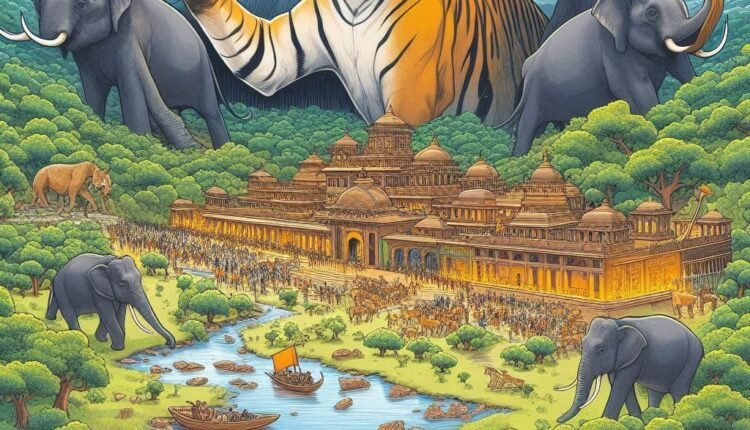Gustakhi Maaf Haryana-Pawan Kumar Bansal.
Extracts from coming book Green Betrayal, Green Conflict, and Moral Dilemmas: Aravalli Jungle Safari in Haryana” authored by Vinod Bhatia retired IFS officer Haryana.
The Aravalli Jungle Safari, a proposed eco-tourism project in the Aravalli Range near Gurugram, Haryana, India, has become a focal point for debates surrounding environmental conservation, economic development, and social justice. This project, which involves the development of a safari park and associated infrastructure, has raised concerns among environmentalists, local communities, and wildlife experts. Let us examine the Aravalli Jungle Safari project through the lens of green betrayal, green conflict, moral dilemmas and government perspectives in exploring the complex interplay of these factors in shaping the project’s trajectory.
The Aravalli Jungle Safari project, proposed in the Aravalli Range near Gurugram, Haryana, India, has been a subject of considerable controversy since its inception. The government believes that this ambitious eco-tourism venture aims to create a safari park, offering visitors the opportunity to observe wildlife in a controlled environment. The project envisages the development of a safari park on approximately 10000 acres of declared forest land in the Aravalli Range. The park would include enclosures for various wildlife species, such as tigers, lions, elephants, and deer. Visitors would be able to tour the park in safari vehicles, observing the animals in their natural habitat. In addition to the safari park, the project also includes plans for a zoo, a botanical garden, and other recreational facilities.
The Aravalli Jungle Safari project presents a complex moral dilemma for policymakers and stakeholders. On the one hand, the project offers the promise of economic development and job creation as seen through the government lens but it raises concerns about the potential negative impacts on the environment and local communities.
One of the key moral dilemmas is the trade-off between short-term economic gains and long-term environmental sustainability. While the safari park may provide short-term economic benefits, it is essential to consider the long-term consequences for the environment and future generations.
The project has faced significant opposition from environmentalists, local communities, and wildlife experts due to concerns about its potential negative impacts on the fragile Aravalli ecosystem. The Aravalli Jungle Safari can be seen as a project where initial commitments to environmental protection have been compromised in favour of economic development and political expediency. The Aravalli Range, a fragile ecosystem that serves as a vital green lung for Delhi and the surrounding region, has been under threat due to urbanization, deforestation, and illegal mining. The proposed safari park, while ostensibly aimed at promoting environmental education and conservation, raises concerns about its potential impact on the entire ecosystem in Aravalli Mountain Range.
One of the key areas of concern is the potential for habitat fragmentation and loss of biodiversity. The construction of the safari park would require clearing of forest land, which could disrupt the ecological balance of the Aravalli Range. Additionally, the introduction of exotic species for the safari park could pose a threat to native wildlife. These actions would contradict the stated goals of environmental protection and conservation.
Furthermore, the project has been criticized for its potential to exacerbate the problem of illegal mining in the Aravalli Range. The construction of the safari park could create demand for building materials and other resources, which could incentivize illegal mining activities. This would undermine efforts to protect the Aravalli Range from further degradation. The construction of infrastructure for the safari park could lead to soil erosion and degradation of the Aravalli slopes.
One of the key areas of conflict is the issue of land acquisition. The project requires the acquisition of significant tracts of land, which has led to protests from local communities who fear displacement and loss of livelihoods. These conflicts have highlighted the social tensions surrounding land use and development in the region. Additionally, there have been concerns about the potential impact of the safari park on the water resources of the Aravalli Range. The construction of the project could lead to increased demand for water, which could strain already scarce resources and impact local agriculture and livelihoods.
The project has therefore sparked intense green conflicts, pitting various stakeholders against each other. Environmental activists and local communities have raised concerns about the project’s potential negative impacts on the environment and their livelihoods. On the other hand, proponents of the project argue that it would boost tourism, create jobs, and promote environmental awareness.
The Aravalli Jungle Safari project has faced several legal challenges. Environmental activists have filed petitions against the project, citing violations of environmental laws and regulations. The courts have issued various orders staying the project’s implementation, pending further hearings.
The biggest moral dilemma is the question of equity and justice. The project has the potential to benefit certain stakeholders, such as tourism operators and developers, while also harming others, such as local communities and wildlife. It is important to consider how the benefits and costs of the project are distributed and to ensure that marginalized communities are not disproportionately affected. Addressing the challenges posed by the Aravalli Jungle Safari project requires a careful balancing of economic development, environmental protection, and social justice. It is essential to engage in open dialogue and collaboration among all stakeholders to find solutions that are sustainable and equitable. By learning from the lessons of the Aravalli Jungle Safari project, we can work towards a more sustainable and just future for our planet.
As of now, the Aravalli Jungle Safari project remains stalled due to legal challenges and ongoing protests. The Haryana government has been under pressure to reconsider the project in light of the environmental concerns raised by various stakeholders. While there have been attempts to find a compromise solution, the project’s future remains uncertain.
Finally, it can be concluded that Aravalli Jungle Safari Project is a perfect case study of green betrayal, green conflict and moral dilemma. It is definitely a complex and controversial venture that raises important questions about the balance between economic development and environmental protection. While the project offers the promise of job creation and tourism promotion, it also poses significant risks to the fragile Aravalli ecosystem. The ongoing legal battles and protests highlight the importance of public participation and transparency in decision-making processes related to environmental projects. Let us just hope that the dilemma of having or not having this project is resolved soon amicably and without judicial intervention.

